Sociology at York, Past, Present and Future
Andrew Webster: Personal Reflections - Day Two
Keynote
Keynote paper
 He showed a couple of old photos of the DA discussion group led by Mike (spot Malcolm Ashmore, Steve Woolgar, Trevor Pinch etc). It was discourse analysis that took him into a detailed and critical examination of conventional psychology and a move towards ‘discursive psychology’, which focuses on the naturalistic setting and contingency of interaction rather than the (experimental/statistical) regularity of behaviour as offered by mainstream psych.The second day opened with a keynote paper from Jonathan Potter (Loughborough) who recalled his days at York working alongside Mike Mulkay and Paul Drew and engaging with both the sociology of scientific knowledge and discourse/conversation analysis.
He showed a couple of old photos of the DA discussion group led by Mike (spot Malcolm Ashmore, Steve Woolgar, Trevor Pinch etc). It was discourse analysis that took him into a detailed and critical examination of conventional psychology and a move towards ‘discursive psychology’, which focuses on the naturalistic setting and contingency of interaction rather than the (experimental/statistical) regularity of behaviour as offered by mainstream psych.The second day opened with a keynote paper from Jonathan Potter (Loughborough) who recalled his days at York working alongside Mike Mulkay and Paul Drew and engaging with both the sociology of scientific knowledge and discourse/conversation analysis.
This led to key differences of approach: so for example, in regard to the exploration of attitudes, conventional approaches see this as an inner disposition (increasingly a matter for neuroscience) and one that can be examined through looking at the languages of evaluation (such as racist talk) whereas discursive psychology considers instead the contexts and places where such evaluations are used. The latter is then more action-oriented and focused on the performativity of beliefs and actions.
Discourse & interaction
Speakers and panels
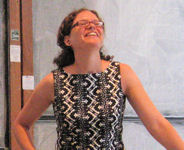
Merran Toerien (York) offered a very good example of the perfomativity and contextuality of social interaction through a detailed discussion the ways in which research nurses recruit patients to randomised clinical trials. This is an example of ‘ institutionalised talk’ relating to securing ‘informed consent’ from prospective participants in the trial. Merran’s paper was an excellent illustration of the ways in which current conversation analysis at York is being deployed to examine interactional settings that have important implications for policy and practice.
Through an examination of the very granularity of institutional talk one cannot only develop a critique of the ways in which consent is secured (despite ‘dispreference responses’ from patients) but also how it might thereby be possible to describe what might constitute an ethically acceptable challenges to such responses. This work has major importance for contemporary health research and its regulation and governance.
The panel session on CA/DA that followed provided an opportunity for Paul Drew to recount the contribution that York has made to CA. Paul has taught at York since 1973, a year that also saw the appointment of Mike Mulkay and Tony Wootton. Each brought distinctive and relatively radical intellectual perspectives to bear on the key issue of knowledge, and helped realign our understanding of the social world in terms of participants' (members') understandings and meanings which led to entirely different conceptions of objectivity, truth and 'rational action'.

It was out of Tony Wootton’s work in and critique of the sociology of language that the Department developed the CA course, beginning in 1976. Paul’s contribution was an interest in interaction, and particularly on how social actions are constructed through language, a focus that continues to be his central interest today. Working with the linguists at York, a major breakthrough was the first demonstration of relationships between syntax and the sequential context of social actions.
Paul illustrated this through an example of(lexico-syntactic) forms in which offers are generally made. These can be of momentous import. Blair got into such a tangle when, at the July 2006 G8 meeting in St Petersberg, in a conversation recorded through a microphone which was inadvertently left on, he tried to offer assistance in mediating in the Israeli-Hezbollah situation in Lebanon. Blair's difficulties in formulating the offer allowed Bush to slide away from it - an illustration of the point that conversation is the primordial site of (all) social life.
Robin Wooffitt spoke of his work on paranormal experiences and the discourse of those who both experience them and of the psychics that act as voices for or interpreters of them. This empirical focus on anomalous experience and its accounting is rooted in Robin’s wider interest in answering the question of ‘what kind of species are we’, to which he answers both communicative beings and beings with consciousness. The latter he believes will be one of the key areas for future advances in the social sciences.
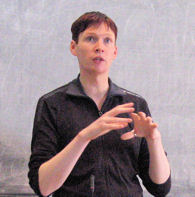
The morning session on language and interaction closed with two linked pieces, a paper by Nick Prior (Edinburgh) ( À la recerche du Texte Perdu: Lost in Hypermedia ) discussing the US TV series Lost , and a joint local panel comprising Roger Burrows, Nick Gane and Simon Winlow that discussed another TV series (not readily available in the UK), The Wire.
Nick explored the sociological value and utility of fictional texts such as Lost and their specific configuration as hyper- rather than merely new media. The former refers to text that is not only presented in multi/trans-media forms but uses plot lines that take us – the viewer – through a series of oscillating narratives in a Deleusian avoidance of any central storyline or single question; instead Lost has ‘rhizomatic’ qualities.
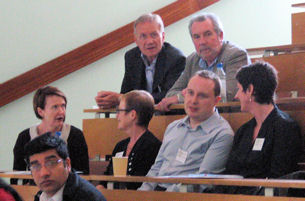
The programme has rich sociological value through its meshing of biographies, hierarchies, divisions of labour and personal and public troubles. Similar sociological sensibilities can be seen in The Wire which differentiates the realities of global capital from everyday social life through its focus on the background rather than foregrounded action.
Both programmes were said to be a provocation for social inquiry (and in fact, there has been a very recent call made for papers on The Wire that discusses its critical role in this regard).
Gender & Women's Studies
Speakers
The final session on Gender and Women’s Studies opened with a guest lecture by Bev Skeggs (Goldsmiths College London) which provided a fascinating analysis of her previous and current research on class, gender and the meaning of ‘respectability’.
Using but also critiquing Bourdieu’s work on social capital, Bev argued that one has to have an identity which is visibly recognisable as having value, as well as social respectability (respectable socio-political capital). Those who cannot use identity as a resource, because they are misrecognised as pathological and cannot make the same public subjective displays of worth.
She went on to explore the ways in which working class culture has been de-valued, and its former social capital anchored in a sense of dignity and moral worth eroded. Now the class is subject to increasing surveillance and framed as a culture that lacks respectability, reproduced for example in the register of the ‘chav’, but which at the same time should attract ‘pity’ and the possibility of ‘redemption’ for – as seen on reality TV – they are represented as having more person-difficulties, experiencing more suffering.
Using empirical data from her recent research on reality TV she explored the responses of working class women to these framings by the middle class – the culture of the ladette, the refusal to embrace respectability defined in middle class terms and the production of very different forms based on labour and care. She concluded by arguing that these tensions simply reflect that the old class struggle over moral authority continues but mediated through new forms.
Panel
The panel on gender took as its theme sexuality and everyday conceptions of how ‘normality in sex’ is socially configured.
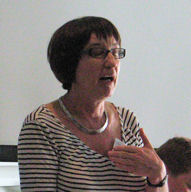 |
Stevi Jackson, of the Centre for Women’s Studies, took an MA student in York in 1973 and came back to the University as Director of the Centre in 1998, and spoke about her critical studies of heterosexuality and her theoretical analysis of the sociality of sexuality, notably through her recent work on sexual pleasure and the sexual self, and the diverse constructions of what is construed as normal sex found within heterosexual relations.
Anne Akeroyd described her work on sexuality and AIDS in South Africa, and within the theme of the panel, discussed the ‘normality’ of violence against women by men in sexual relations, and the ways in which this is a central dynamic in reproducing both the subordination of women and their vulnerability to HIV.
Finally, Petra Nordqvist, PhD student at the Centre described her work on changing concepts of what is perceived to be normal sexual lives for lesbian couples. Lesbian couples who conceive together represent tradition in the sense that they conceive as a couple aiming to form a nuclear family following conventional family ideals. But they also represent novelty: their processes of conception involve from the outset a sperm donor and reproductive technology and the parents in this case are two women. She argued that lesbian couples processes of choosing donors, and desires for suitable donors, tell us something about what is understood in contemporary society to constitute a family.
Close
Final keynote address
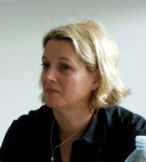
The final keynote address was given by Celia Lury (Goldsmiths College London) entitled ‘ Just Do It: Brands as New Media Objects’. Celia examined the meaning of ‘the brand’ in the contemporary culture of (global) consumption.
The brand – such as the Nike logo on sports gear – acts as a medium or interface that actively frames and promotes interaction between producer and consumer; the logo acts as a device to not only foster brand identity but to strengthen affective relations between brands and consumers. But brands are also open and invite consumer participation and co-production of the image itself – ‘just do it’. It opens up possibilities for meaning and as it does so extends its range as a site of consumption. Celia concluded by arguing that the brand can as a result act to reaffirm locality or in contrast ‘de-territorialise’ itself as a global product. The paper nicely returned us to the relationship between materiality and culture that was central to Trevor Pinch’s opening keynote, for brands evoke a materiality (of product) but one that is mediated through circuits of consumption and re-presentation that open up a much wider range of affordances of meaning.
This summary of the various presentations does not do justice to the depth of the original papers, but it does give an indication of the range and richness of issues that were covered over the two days.
